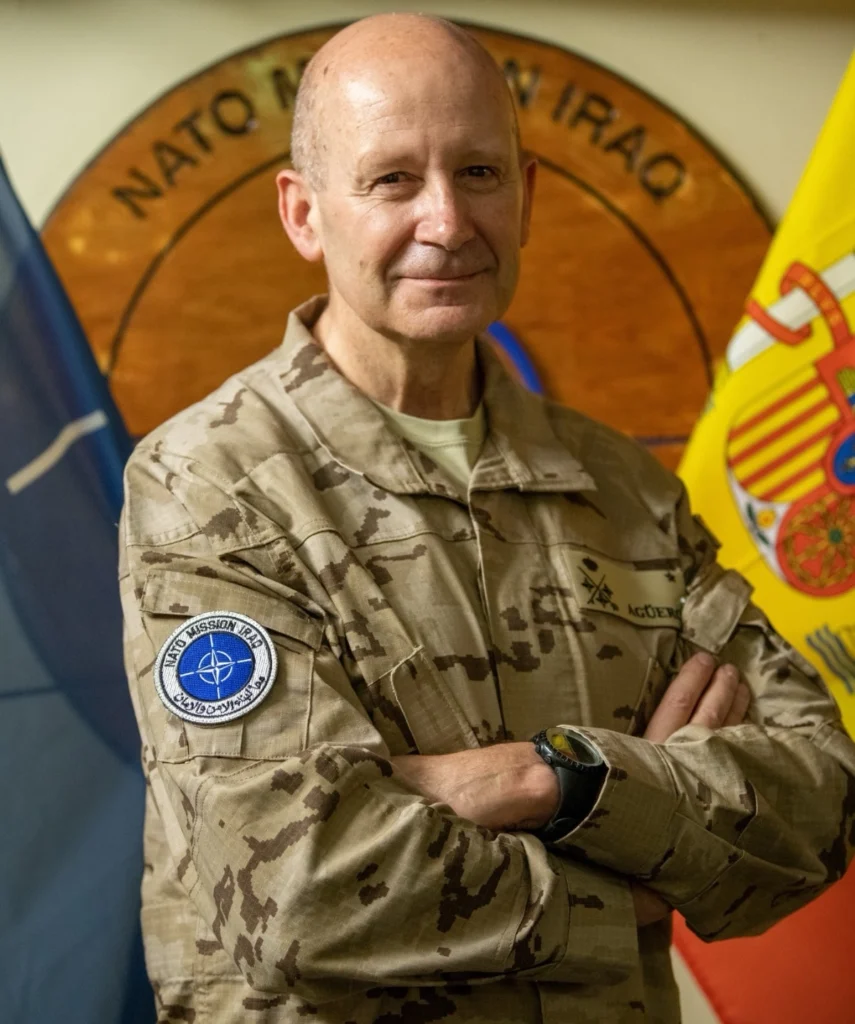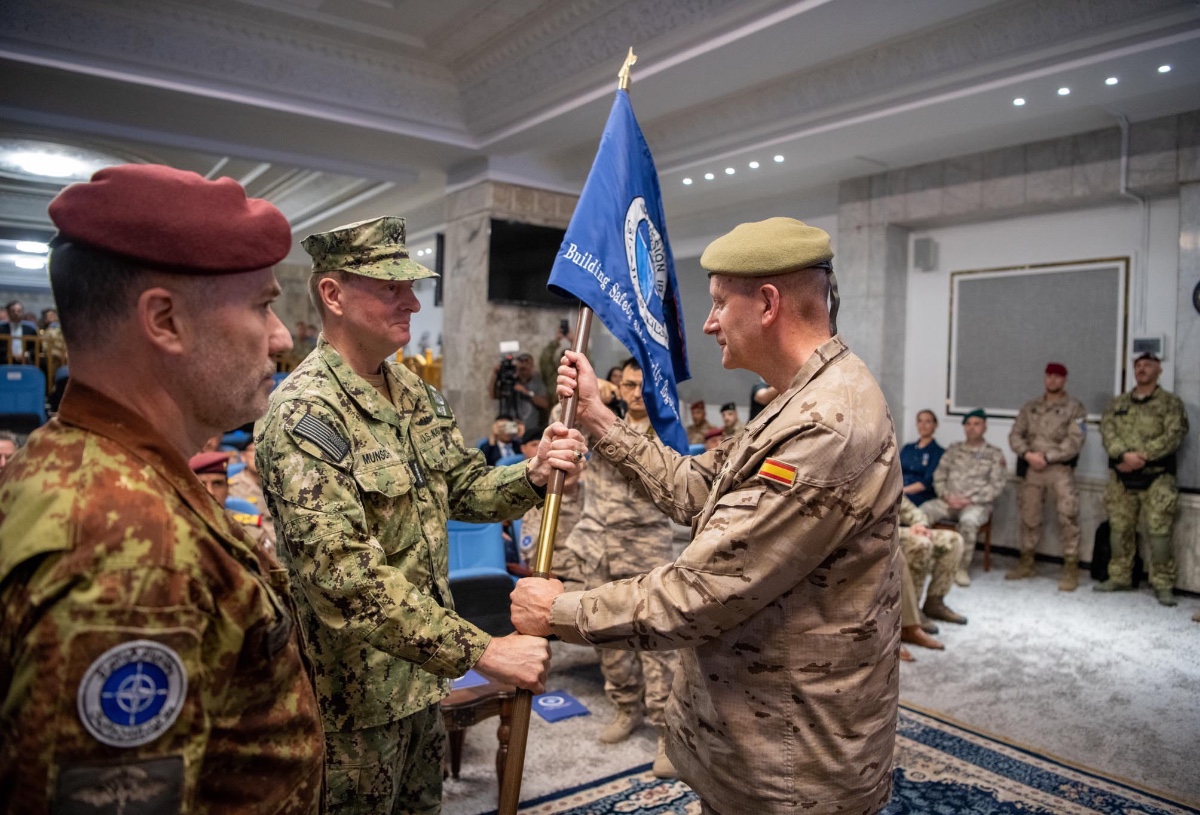
Exclusive Interview: 75th Anniversary of the Establishment of NATO
To read the full report on NATO Mission in Iraq: One Mission, Many Nations, click here.
Lieutenant General José Antonio Agüero Martínez

Lieutenant General José Antonio Agüero Martínez was born in December 1963, in the Toledo region.
He joined the Army in 1981 and graduated from the Military Academy (Zaragoza) as an Infantry Lieutenant in 1986. He was promoted to LTG in November 2022. He is currently posted as Advisor to the Spanish Chief of the Army.
In his military career, he has served in three main Units:
- 11 years in the Spanish Airborne Brigade as Platoon, Company and Battalion Commander.
- 6 years in the current Castillejos Division HQ, as Major in G2, as Lieutenant Colonel he was appointed Branch Chief and as Colonel Chief of Staff.
- 11 years in the Spanish LCC HQ and NRDC-ESP HQ, both of them located in the Valencia region. He has served in these Units as Major in G7, Colonel Assistant to DCOS OPS, Brigadier General DCOS PLANS and Major General Chief of Staff from December 2019 to 2022.
Apart from these posts, General Agüero has also been posted in the Infantry Academy (Toledo) in the Officers’ Training Department and in the Army Personnel Directorate (Madrid), as Chief of the Officer Orientation Department.
He has been deployed on international military missions in Bosnia Herzegovina (both in UNPROFOR and in IFOR) and Afghanistan (in the ISAF HQ and as Chief of a Mentoring Team of an Afghan Corps).
Among General Agüero’s courses, the most relevant are those of Special Operations, Free Fall Parachuting, General Staff and the Advanced Command and Staff Course in the UK. He also holds a Master’s degree in Defense Studies from King’s College.
Can you provide iNNOV8 with an overview of NATO's background and its current presence in Iraq? Why is NATO considered Iraq's best opportunity to enhance its military capabilities within the country and across the broader region?
NATO was born in 1949 because no country was then able to face alone the threats posed by external adversaries. Threats and adversaries have changed along the years, but the Alliance has adapted to the new challenges. Today this Organization is composed of 32 countries, 20 more that those that signed the North Atlantic Treaty in 1949. 40 more keep a partnership relationship with the Organization. This alone is proof enough of its success as a security provider. This organization, originally intended to defend countries in both sides of the Northern Atlantic, is now operating in Iraq because its government required, in 2018, its support to reform its Security Sector.
To achieve this, NATO advises Iraqi defence and security officials mostly in the Ministry of Defence and the Ministry of Interior. The mission also supports Iraq’s military education institutions and the Service Commands. Areas of support include Defence Planning, Budget and Procurement, Crisis Management, Readiness, Intelligence, Cyber Security, Logistics, Human Resources Management, International Humanitarian Law, Building Integrity, Women Empowerment etc.
One of the first and most important achievements NMI made in collaboration with their Iraqi colleagues was an agreement on 32 long-term objectives (LTO) for NMI-Iraqi cooperation. There is a plan for every LTO, where an end state is identified, as well as intermediate objectives, lines of engagements and a timetable to reach it. This allows NATO to align their expertise to Iraqi identified areas in need of improvement.

How would you assess the effectiveness of NATO Mission Iraq (NMI) thus far? Could you highlight the evolutions or modifications NMI has undergone since its establishment in 2018? Has NMI met its own goals and objectives? How does the host country assess NMI’s ability to meet their expectations of the NMI mission?
When I took the Command of this mission in May 2023, I found an excellent job done by my predecessors. The NMI structures were strongly consolidated, and NMI advisors had established well-defined relationships with our Iraqi counterparts. They conduct regular cooperation activities with Iraqi Institutions. In fact, the perception is that Iraqi Security Forces, and NMI stakeholders in Ministries and Institutions, are satisfied with NMI job and the way that our personnel advises them to integrate NATO standard procedures in their regular activities. As an example, in January 2023, the Iraqi Chief of Defense (CHOD) inaugurated the NATO Codification System bureau in Iraq, an important milestone to get more proficient, efficient and accountable logistics mechanisms. The CHOD recognized the key benefits of a standardized system to reduce logistic costs and enable enhanced readiness for Iraqi Defence. Another important advance was the extension of NMI advisory activities in the Ministry of Interior, to support the transition of the Iraqi Federal Police from green (military Unit) to blue (law enforcement institution).
We are proud to support Iraq in its requirements to reform its Security Sector to become a more prosperous country. To that extent, the goals of NMI are the goals of the Government of Iraq. Just one month ago, NMI and the Iraqi Ministry of Defence agreed to update our Joint Action Plan, in accordance with Iraqi requirements.
From a strategic standpoint, how do you appraise the progress of the Iraqi armed forces, and in what ways could NMI support Iraqi military objectives that would otherwise be exceedingly challenging for Iraq to achieve independently?
NMI offers to its counterparts NATO successful experience in dealing with the same problems that Iraq faces. Iraq is not Europe or North America; it has its own history, culture, organization and tradition. It is up to the Iraqis to organize their Security Sector adapting our advice to their specific circumstances. We share our experience and knowledge through our advisory activities aimed at further strengthening Iraqi Security Forces and Institutions.
From my previous experience as a mentor, I see four steps in the advisory process:
- To detect any problem.
- To propose a solution, in this case in accordance with NATO experience.
- To assist our interlocutor to find his solution, the one that best fits his specific circumstances, assuming or adapting our proposal to his needs.
- To assume as ours the solution chosen by our interlocutor and support its implementation.
In order to do this, the advisor needs knowledge and experience. Additionally, the following four values that are key to gain the trust of our counterparts:
- Patience to progress as fast as our interlocutors can do.
- Understanding when our proposals are altered or adjusted to be more effective in local circumstances.
- Loyalty to assume the decisions taken by our counterparts.
- Commitment with the success of our partners, because we cannot make differences between their success and our success.
As NMI has been expanding consistently over the past five years since its inception in 2018, could you provide insights into the size of the funding allocated to NMI from NATO member countries?
NMI has over the past five years, upon Iraqi request and consent, evolved its activities into more Security Institutions within the MoD and since the summer of 2023, into the Federal Police Command of the Ministry of Interior:
- We work with the office of the Iraqi Prime Minister, especially on issues concerning the Iraqi Security Sector Strategy and Cyber Security.
- The Office of the National Security Advisor is our institutional PoC, especially for administrative issues. It is also our interlocutor concerning Iraq National Security Policy.
- We work in the MoD at directorate level and above.
- We work with the Service Commands.
- We work with the Federal Police Command and some specific directorates within the MoI.
- We advise 11 out of 16 Professional Education Institutions of the MoD.
- We advise 15 out of 27 Branch & Service Schools within the GBA.
Any extension of NATO Mission Iraq’s efforts beyond its current mandate needs approval by the North Atlantic Council (NAC), NATO’s decision-making body in close coordination with the Government of Iraq. Following this premise, the number of LTOs has also increased throughout the past five years, until the current 32. These figures will probably increase over time because the Iraqi authorities are interested in evolving NATO advisory activities in other areas of its Security Sector. The advice provided by NMI is demand driven. We can initially take the lead in some activities, for example in developing a specific training. However, we will not start any activity unless our counterparts deem it necessary and commit themselves to give it continuity, assuming in the future its organization and execution.
However, it is important to highlight that, if NMI evolution implies an increment of advisors, NMI must ask for the authorization of the Government of Iraq to deploy more personnel. NMI always respects Iraq’s sovereignty, and territorial integrity.
Regarding the second part of your question, there are currently 26 nations that contribute with their personnel to the success of NMI, 25 of them are NATO members, and 1 is NATO partner, Australia. Concerning the funds, our troop contributions nations respond to NATO requests for personnel according to the Mission’s needs. NMI is an advising mission, not a provider of equipment.
If asked by Iraq to replace the International Coalition Forces, would that be something that NATO would consider? And what would the practical steps and mechanism look like?
This hypothetical situation is unlikely to occur. As you well know, because Iraqi Ministries’ spokespersons have underlined in different local media statements that, the situation of International Coalition Forces should evolve towards bilateral agreements in the areas of security and defense, with “former” coalition members, among which several NATO Allies. It is something that Iraq, as an independent State, has decided. In this context, I do not expect that Iraq will request NATO to replace those forces.
On the other hand, NMI objectives are different to those of OIR. This Coalition is in Iraq to support Iraqi Security Forces (ISF) to defeat DAESH and prevent its reconstitution. We have nothing to do with counter terrorist operations. Our objective lies in the reform of the Iraqi Security Sector, an objective much more ambitious, challenging and longer term.
Given the addition of two member countries to NATO, Sweden and Finland, and the ongoing conflict in Ukraine, do you anticipate “donor fatigue” or change in prioritization of other missions at the expense of NMI?
NATO is a defensive alliance, whose purpose is to protect its member states. Our exercises and military deployments are not directed against any country. We do not seek confrontation, but we cannot ignore that the conflict in Ukraine undermines European stability and security. We must always be postured to deter and if necessary defend against any threats to Alliance territory and populations.
For the above-mentioned reasons, NATO Allies maintain a strong presence in Eastern Europe. These deployments are entirely defensive in nature. As for Ukraine specifically, NATO Allies continue to offer practical support, including economic and military aide, to strengthen Ukraine’s ability to defend itself.
Although it is difficult to foreseen the evolution of the Ukraine conflict, there are no indications that NMI’s activities will change because of the situation in Ukraine. NMI will continue to tailor our support to meet the specific needs of the Iraqi Government, and NATO, as an Alliance, has committed to doing so.



